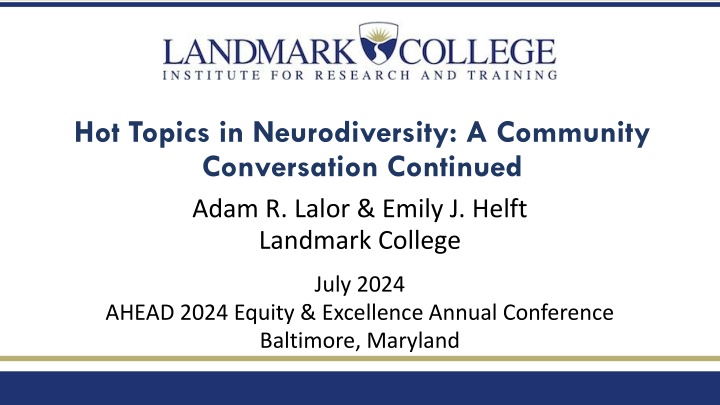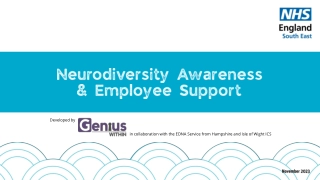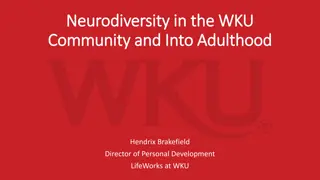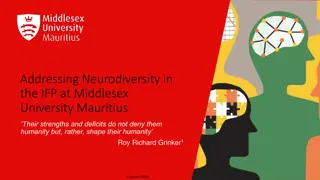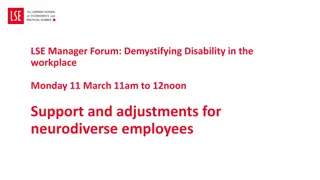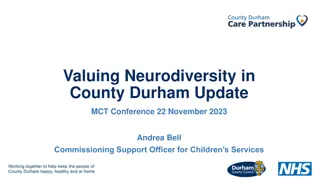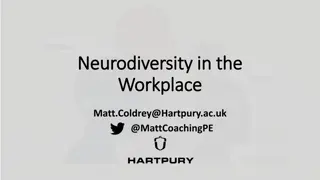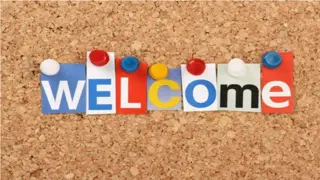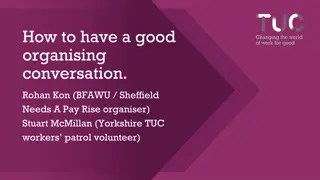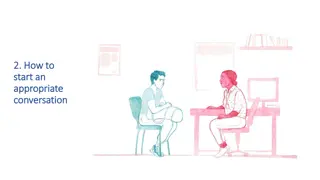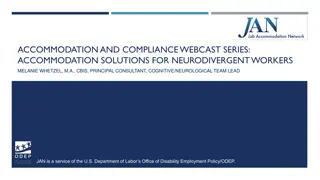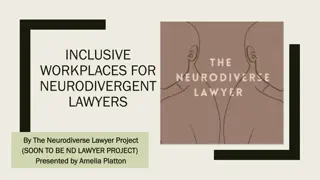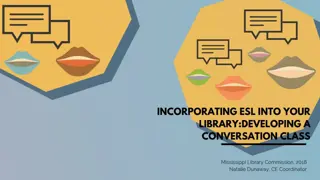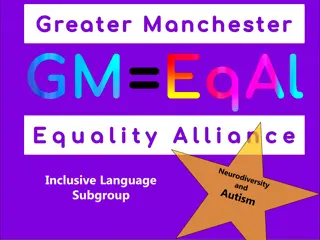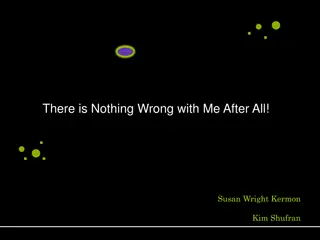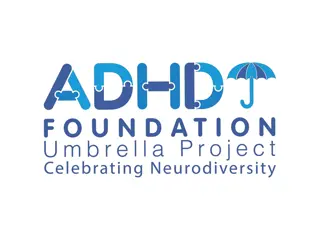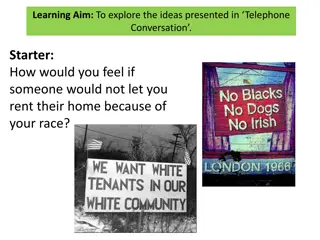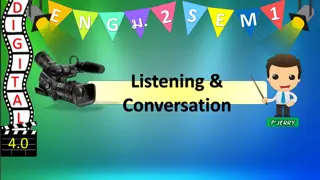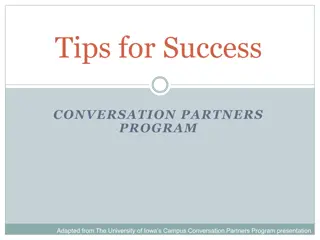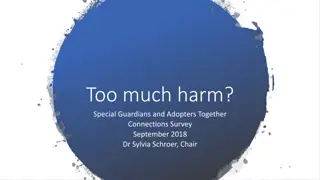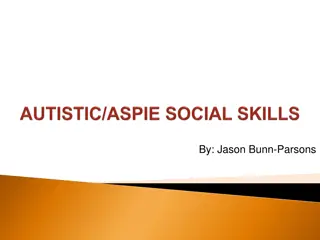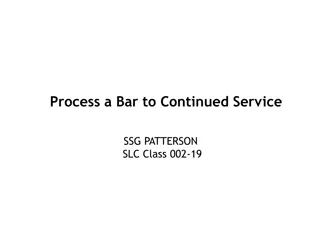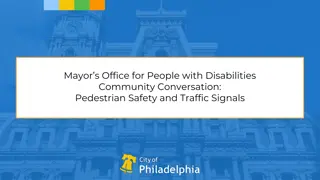Neurodiversity Community Conversation Continued
In this engaging community conversation at the AHEAD 2024 Equity & Excellence Annual Conference, experts address hot topics and emerging issues surrounding neurodiversity, including the variation in brains and cognition, rights advocacy, and societal perceptions. Facilitators Adam R. Lalor and Emily J. Helft from Landmark College lead discussions on neurodivergence, diverse perspectives, and the importance of inclusion and equitable treatment for all individuals. Join the conversation to explore the complexities and opportunities within the neurodiversity movement.
Download Presentation

Please find below an Image/Link to download the presentation.
The content on the website is provided AS IS for your information and personal use only. It may not be sold, licensed, or shared on other websites without obtaining consent from the author.If you encounter any issues during the download, it is possible that the publisher has removed the file from their server.
You are allowed to download the files provided on this website for personal or commercial use, subject to the condition that they are used lawfully. All files are the property of their respective owners.
The content on the website is provided AS IS for your information and personal use only. It may not be sold, licensed, or shared on other websites without obtaining consent from the author.
E N D
Presentation Transcript
Hot Topics in Neurodiversity: A Community Conversation Continued Adam R. Lalor & Emily J. Helft Landmark College July 2024 AHEAD 2024 Equity & Excellence Annual Conference Baltimore, Maryland
Facilitator Introductions - 1 Adam Vice President, Neurodiversity Research and Innovation, Landmark College Ph.D. in Educational Psychology, University of Connecticut Identify as both neurodivergent and disabled Landmark College Institute for Research and Training 2
Facilitator Introductions - 2 Emily (she/her) Assistant Director of Professional Development, Landmark College Institute for Research & Training, Landmark College M.Ed. in School Psychology, The College of William & Mary Ed.S. in School Psychology, The College of William & Mary Identify as Disabled at times Landmark College Institute for Research and Training 3
Agenda Emergence of Neurodiversity Hot Topics Potential Hot Topics for Today s Conversation Vote Conversation Expectations Conversations: Hot Topic #1 Overview Hot Topic #1 Discussion Hot Topic #2 Overview Hot Topic #2 Discussion Hot Topic #3 Overview Hot Topic #3 Discussion Wrap-up Landmark College Institute for Research and Training 4
Emergence of Neurodiversity Neurodiversity is a term coined by Judy Singer in the late- 1990s that has received increased attention in the last decade. Neurodiversity refers to the variation in brains and cognition that occurs naturally among people and a movement to secure rights, recognition, opportunities, inclusion, access, and equitable treatment for this population. Neurodivergent refers to people whose brains physically and/or functionally differ from what society considers the norm Landmark College Institute for Research and Training 5
Neurodiversity Hot Topics (1) Considerable discussion about neurodiversity. Some like the concept, some do not, some have mixed thoughts, and many are ambivalent. At Landmark College we have been discussing neurodiversity and neurodivergence for years, and our community has varied opinions. Landmark College Institute for Research and Training 6
Neurodiversity Hot Topics (2) Still, we engage in challenging discussions so that we can better understand the perspectives of the members of our campus community and broader society. Today, we invite you to participate in conversations on some of the topics that we have been wrestling with. Landmark College Institute for Research and Training 7
Selecting Our Hot Topics The neurodivergent hierarchy Interchangeable Terms? Neurodiverse and Neurodivergent Neurodivergent is a referential term The neurodiversity movement and the disability rights movement Micro-credentialing's impact on accessibility in postsecondary ed. Neurodivergence, gender, and sexuality Neurodiversity and disability cultural centers Establishing dyslexia as a separate category from specific learning disability under IDEA Neurodivergent/autism residence halls 1. 2. 3. 4. 5. 6. 7. 8. 9. Landmark College Institute for Research and Training 8
Vote for your favorite topic! tinyurl.com/AHEADHotTopics24 Landmark College Institute for Research and Training 9
Conversation Expectations (1): Listen respectfully, without interrupting. Listen actively and with an ear to understanding others' views. (Don t just think about what you are going to say while someone else is talking.) Critique ideas, not individuals. Commit to learning, not debating. Comment in order to share information, not to persuade. University of Michigan (n.d.). Guidelines for Discussing Difficult or High-Stakes Topics https://crlt.umich.edu/publinks/generalguidelines#rules Landmark College Institute for Research and Training 10
Conversation Expectations (2): Avoid blame and inflammatory language. Allow everyone the chance to speak. (Please limit comments to *no more than 90 seconds/1 minutes*) Avoid assumptions about any member of the group. Do not ask individuals to speak for their (perceived) social group. University of Michigan (n.d.). Guidelines for Discussing Difficult or High-Stakes Topics https://crlt.umich.edu/publinks/generalguidelines#rules Landmark College Institute for Research and Training 11
The Neurodivergence Hierarchy Is there discrimination within the neurodivergent community related to diagnosis? Who has power and who does not? Who does the neurodiversity movement reflect? Who is leading the neurodiversity movement and why? What are the implications of this for Disability Resources Offices? Landmark College Institute for Research and Training 12
Interchangeable Terms? Neurodiverse and Neurodivergent Some people, use the terms neurodiverse and neurodivergent interchangeably. Is this problematic or not? Does it matter? Who uses each of these terms? In what contexts? Does this afford opportunities? Challenges? Neither? Both? Something else? What are the implications of this for Disability Resources Offices? Landmark College Institute for Research and Training 13
Neurodivergent is a Referential Term By definition, the term neurodivergent is referring to difference from something. Is this problematic or not? Why? Who defines the reference point? Can the reference be defined? How divergent from the reference must someone be to be neurodivergent? Is divergence negative? What are the implications of this for Disability Resources Offices? Landmark College Institute for Research and Training 14
The Neurodiversity Movement and the Disability Rights Movement What, if anything, is the difference between the neurodiversity movement and the disability rights movement? Are the movements complementary to one another? Is there tension between ideology/beliefs (perceived or actual)? If so, in what ways? What is the impact? Does the neurodiversity movement incorporate perspectives on disability and the voices of disabled people? What are the implications of this for Disability Resources Offices? Landmark College Institute for Research and Training 15
Micro-credentialings Impact on Accessibility in Post-secondary Education If micro-credentials allow everyone the opportunity to niche down (and therefore avoid certain education requirements by choice), does this level the educational and employment playing field for neurodivergent people? Does it do the opposite? Will micro-credentialing disproportionately impact neurodivergent people (positively or negatively)? What are potential implications for the number of neurodivergent graduates with college degrees? What are the implications of this for Disability Resources Offices? Landmark College Institute for Research and Training 16
Neurodivergence, Gender, and Sexuality Does the neurodiversity movement neglect the experiences of people who do not identify as men and/or do not identify as heterosexual? Can neurodivergence be teased apart from gender or sexuality? What are the implications of this for Disability Resources Offices? Landmark College Institute for Research and Training 17
Neurodiversity and Disability Cultural Centers Should neurodiversity cultural centers exist separate from disability cultural centers? Should they be part of or separate from disability resource offices? Who should initiate the development of such centers? What division(s) should these centers be within? What are the implications for Disability Resources Offices? Landmark College Institute for Research and Training 18
Establishing dyslexia as a separate category from specific learning disability under IDEA Should dyslexia be separated into a category separate from Specific Learning Disabilities in IDEA? What are the implications for dyslexic students/faculty/staff who hold SLD as their identity? What are the implications of this for Disability Resources Offices? Landmark College Institute for Research and Training 19
Neurodivergent/Autism Residence Halls Should neurodivergent students and/or autistic students have their own residence hall(s)? Is it housing segregation or identity-based housing? How should this decision be made? What are the implications of this for Disability Resources Offices? Landmark College Institute for Research and Training 20
Certificate program for educators Certificate program for educators Learning Differences and Neurodiversity Learning Differences and Neurodiversity - - 1 1 Specializations in: Executive Function | Autism on Campus | Disability Services Five course, 15 credit graduate-level certificate OR take individual courses www.landmark.edu/certificates Landmark College Institute for Research and Training 21
Certificate program for educators Certificate program for educators Learning Differences and Neurodiversity Learning Differences and Neurodiversity - - 2 2 Anchored in theory & research Flexible schedule for busy professionals Targets concrete classroom practices Mix of live & asynchronous discussion *Visit us at Booth 212!* Visit us at Booth 30! Landmark College Institute for Research and Training 22
THANK YOU! THANK YOU! Adam R. Lalor, Ph.D. Vice President, Neurodiversity Research and Innovation Landmark College adamlalor@landmark.edu Emily Helft, M.Ed., Ed.S. Assistant Director, Professional Development Landmark College emilyhelft@landmark.edu Landmark College Institute for Research and Training 23
